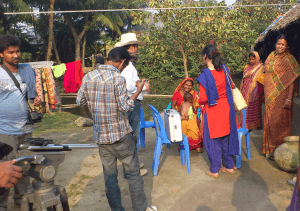 Wei Xun won the Manganese Zone back in June 2011. We asked her to write a report on what she’s done with her £500 prize money, here’s what she’s been up to… In our research group, there is a project that investigates the link between how much salt from the sea has infiltrated the drinking waters, and the health of pregnant women living on the coasts in the district of Dacope, situated in south-western Bangladesh.
Wei Xun won the Manganese Zone back in June 2011. We asked her to write a report on what she’s done with her £500 prize money, here’s what she’s been up to… In our research group, there is a project that investigates the link between how much salt from the sea has infiltrated the drinking waters, and the health of pregnant women living on the coasts in the district of Dacope, situated in south-western Bangladesh.

Bangladesh water pump
From the onset, we wanted to use the prize money to address the fact that very few people are aware that this is a problem. Our original plan was to organise a workshop at the study site for local women to teach them how to recognize and stop drinking salty water, and to get medical help before it is too late.
Since the majority of the women cannot read or write, we needed to use something audio-visual, like a short film, in which complicated scientific and medical concepts are clearly explained in simple terms so they can be understood by people of all ages/literacy levels. My colleague Aneire Khan, who is based in the study area, found a local filmmaker who was willing to make this film on a reduced budget, although additional costs e.g. food and accommodation expenses, were raised from other sources.
The filming took 5 days. We had timed it so it overlapped with a youth engagement programme by WorldSavvy, which brings together U.S. and Bangladeshi high school students and U.S. educators of diverse backgrounds for a cultral exchange experience, , as well as to explore issues of climate change in Bangladesh. The students from the US found the whole experience very exciting!

Filming in Bangladesh
We realised that the short film could be a great way of letting people from other villages/districts, governmental officials, and other research groups know and understand the dangers that drinking salty water poses for the health of pregnant women, and that they need to do something about it. It is also very important that we raise enough money to keep the project going. The next step is to see if it is possible to provide vessels to collect and store enough rainwater to sustain the people through the dry winters, so women would not need to drink the harmful salty groundwater. Again, this film will be very helpful in presenting the study to funding agencies around the world; it’s certainly much less boring than reading 30 pages of application forms!
So finally, it’s time to see for yourself! You can find the film here:
We would like to thank the Wellcome trust and the I’m a Scientist team for giving us the chance of making this film, and most of all to the students who participated and supported our cause. Let’s hope, together, we can make someone’s life better on the other side of the world.

